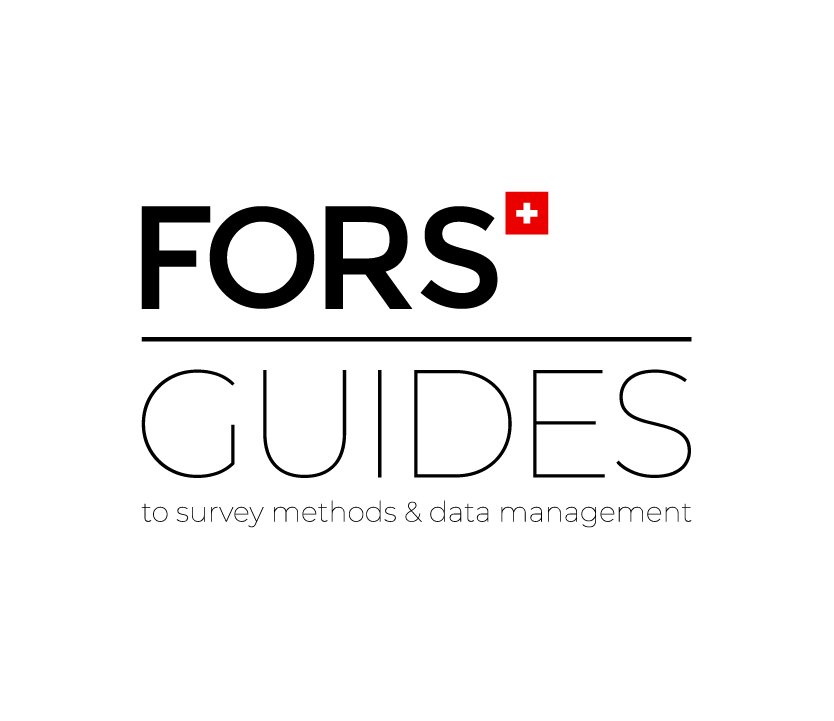Recherche méthodologique
Objectifs de la recherche méthodologique
Notre recherche méthodologique comprend les aspects suivants :
- Les défis associés à la sous-représentation des plans d’échantillonnage, aux effets de la Unit Non-response et aux échecs d’échantillonnage.
- La représentativité et la qualité de réponse des populations minoritaires.
- Les effets des erreurs de mesure.
- Les influences des enquêteurs sur la non-réponse et la qualité de la réponse.
- Des problèmes éventuels lors de la réalisation d’enquêtes multilingues.
- Nous étudions la pertinence de différents modes et techniques de collecte de données pour le travail sur le terrain.
- Nous élaborons des stratégies de collecte de données spécifiques pour différents groupes de population.
- Nous étudions les paradates étant en corrélation avec la réactivité et les variables d’enquête pertinentes afin d’évaluer les biais tout au long de la phase d’une enquête.
- Nous étudions les problèmes de continuité des séries chronologiques en raison des changements apportés à la conception des enquêtes.
- La recherche sur les nouvelles technologies pour la collecte de données d’enquête et l’élaboration de Best Practices.
- L’exploration des possibilités de compléter les données d’enquête par des liaisons de données et des variables de contexte.
- Nous recherchons également des alternatives aux enquêtes basées sur l’échantillonnage aléatoire, telles que l’utilisation d’enquêtes nonprobability-based et d’autres développements dans la recherche en sciences sociales, tels que la collecte de données sur les réseaux sociaux (Big Data).
Publications récentes de FORS dans le domaine de la recherche méthodologique
Income Imputation in Longitudinal Surveys: A Within-Individual Panel-Regression Approach. Lipps Oliver, Kuhn Ursina, 2023/08/08. Survey Research Methods , 17 (2) pp. 159–175. Peer-reviewed. [URN][DOI][serval:BIB_2780463D3235]
Effects of Changing Modes on Item Nonresponse in Panel Surveys. Lipps Oliver, Voorpostel Marieke, Monsch Gian-Andrea, 2023/06/01. Journal of Official Statistics, 39 (2) pp. 139-149. [URN][DOI][serval:BIB_9CA10E54B4E0]
Das Longitudinale Mixed Methods-Design der PICE-Studie (Parental Investment in Children’s Education). Kamm Chantal, Heers Marieke, Sandra Hupka-Brunner, Gomensoro Andrés, 2023/03/06. TREE Technical Paper Series.[serval:BIB_8D38C235D3AF]
Qualitative data anonymisation: theoretical and practical considerations for anonymising interview transcripts. Diaz Pablo, Stam Alexandra, 2023/03/01. FORS GUIDES . [URN][serval:BIB_1EEA4C9B2249]
Combining data collection modes in longitudinal studies. Roberts Caroline, Voorpostel Marieke, 2023/01/12. dans Withstanding Vulnerability throughout Adult Life. Dynamics of Stressors, Resources, and Reserves, Palgrave.
[URN][serval:BIB_27ED196CB03A]
Identifying Research Quality in the Social Sciences. Ochsner Michael, 2022/04/12. pp. 48-66 dans Engels Tim C. E., Kulczycki Emanuel (eds.) Handbook on Research Assessment in the Social Sciences chap. 4, Edward Elgar. [URN][serval:BIB_AB4513EFF8D6]
Do peers share the same criteria for assessing grant applications?. Hug Sven E, Ochsner Michael, 2022/01/03. Research Evaluation, 31 (1) pp. 104-117. Peer-reviewed. [DOI][serval:BIB_8A4D26697770]
Identifying Research Quality in the Social Sciences. Ochsner Michael, 2022/04/12. pp. 48-66 dans Engels Tim C. E., Kulczycki Emanuel (eds.) Handbook on Research Assessment in the Social Sciences chap. 4, Edward Elgar. [URN][serval:BIB_AB4513EFF8D6]
Data Privacy Concerns as a Source of Resistance to Complete Mobile Data Collection Tasks Via a Smartphone App. Roberts Caroline, Herzing Jessica M E, Sobrino Piazza Jimena, Abbet Philip, Gatica-Perez Daniel, 2022/06/17. Journal of Survey Statistics and Methodology. Peer-reviewed. [URN][DOI][serval:BIB_401A1E3B938E]
Effects of Question Characteristics on Item Nonresponse in Telephone and Web Survey Modes. Lipps Oliver, Monsch Gian-Andrea, 2022/08/28. Field Methods pp. 1525822X2211158. Peer-reviewed. [URN][DOI][serval:BIB_3872C7C469BE]
Conditional distributions of frame variables and voting behaviour in probability‐based surveys and opt‐in panels. Pekari Nicolas, Lipps Oliver, Roberts Caroline, Lutz Georg, 2022/09/27. Swiss Political Science Review. Peer-reviewed. [URN][DOI][serval:BIB_2D4AF9BBD0F8]
The effect of unemployment on couples separating in Germany and the UK. Di Nallo Alessandro, Lipps Oliver, Oesch Daniel, Voorpostel Marieke, 2021/10/02. Journal of Marriage and Family. [URN][DOI][WoS][serval:BIB_EAC9DFE18DEE]
Sequentially mixing modes in an election survey. Lipps Oliver, Pekari Nicolas, 2021/05/18. Survey Methods: Insights from the Field. Peer-reviewed. [URN][serval:BIB_E795D2CD150A]
Panel surveys: advantages and disadvantages compared with repeated cross-sectional surveys. Lipps Oliver, 2021/03/19., FORS. [URN][serval:BIB_E2F53D267478]
Mixing modes in household panel surveys: Recent developments and new findings. Voorpostel Marieke, Lipps Oliver, Roberts Caroline, 2021. dans Advances in Longitudinal Survey Methodology, Wiley. [serval:BIB_2B0D4F458D36]
Transforming a Patient Registry Into a Customized Data Set for the Advanced Statistical Analysis of Health Risk Factors and for Medication-Related Hospitalization Research: Retrospective Hospital Patient Registry Study. Taushanov Z., Verloo H., Wernli B., Di Giovanni S., von Gunten A., Pereira F., 2021/05/11. JMIR medical informatics, 9 (5) pp. e24205. Peer-reviewed. [DOI][WoS][Pmid][serval:BIB_23E7F1CBEE88]
Integrating online data collection in a household panel study: effects on second-wave participation. Voorpostel Marieke, Roberts Caroline, Ghoorbin Margarita, 2021. Survey Methods: Insights from the Field. [DOI][serval:BIB_5A25D1757E21]
The European Values Study 2017: On the Way to the Future Using Mixed-Modes. Luijkx Ruud, Jónsdóttir Guðbjörg Andrea, Gummer Tobias, Ernst Stähli Michèle, Frederiksen Morten, Ketola Kimmo, Reeskens Tim, Brislinger Evelyn, Christmann Pablo, Gunnarsson Stefán Þór et al., 2020/11/24. European Sociological Review. Peer-reviewed. [URN][DOI][serval:BIB_44A99FABE750]
Investigating the Relative Impact of Different Sources of Measurement Non-Equivalence in Comparative Surveys. An Illustration with Scale Format, Data Collection Mode and Cross-National Variations Roberts Caroline, Sarrasin Oriane, Ernst Stähli Michèle, 2020/10/10. Survey Research Methods, 14 (4) pp. 399-415. Peer-reviewed. [URN][DOI][serval:BIB_424A8E8E756E]
A cross-validation of R-indicators as a measure of the risk of bias using data from a non-response follow-up survey. Roberts C., Vandenplas C., Herzing J. M. E., 2020/07/28. Journal of Official Statistics, 36 (3) pp. 675–701. Peer-reviewed. [URN][DOI][serval:BIB_EA0D21AB221D]
Model‐based clustering and analysis of life history data. Scott Marc A., Mohan Kaushik, Gauthier Jacques-Antoine, 2020/05/23. Journal of the Royal Statistical Society: Series A (Statistics in Society), 183 (3) pp. 1231–1251. [DOI][WoS][serval:BIB_63E2D591D61E]
Can Interviewer Evaluations Predict Short-Term and Long-Term Participation in Telephone Panels? Lipps Oliver, Voorpostel Marieke, 2020/03/01. Journal of Official Statistics, 36 (1) pp. 117-136. Peer-reviewed. [URN][DOI][serval:BIB_565DBE25A0B3]
Investigation of alternative interface designs for long-list questions–the case of a computer-assisted survey in Germany. Herzing Jessica M. E., 2020/02/04. International Journal of Social Research Methodology pp. 1-12. Peer-reviewed. [URN][DOI][serval:BIB_565E200A3B73]
For all scientific publications by FORS collaborators see here.
Going beyond the single item: deriving and evaluating a composite subjective wellbeing measure in the Swiss Household Panel
Dawid Gondek, Eduardo García Garzón, Núria Sánchez-Mira, Leen Vandecasteele, Stephanie Steinmetz, Marieke Voorpostel
2023-2
Political interest in Swiss probability-based political and social surveys
Nursel Alkoç
2023-1
Family Diversity: Updating a Household Typology in the Swiss Household Panel
Sandrine Morel
2021-3
Entropy measures of social mobility: The example of the intergenerational transmission of education
Georg P. Mueller
2021-2
Measurement of Sexism, Gender Identity, and Perceived Gender Discrimination: A Brief Overview and Suggestions for Short Scales
Jérôme Blondé, Lavinia Gianettoni, Dinah Gross and Edith Guilley
2021-1
Negative Voting Revisited: The 2020 US Presidential Election
Diego Garzia and Frederico Ferreira da Silva
2021-3
Entropy measures of social mobility: The example of the intergenerational transmission of education
Georg P. Mueller
2021-2
Measurement of Sexism, Gender Identity, and Perceived Gender Discrimination: A Brief Overview and Suggestions for Short Scales
Jérôme Blondé, Lavinia Gianettoni, Dinah Gross and Edith Guilley
2021-1
Negative Voting Revisited: The 2020 US Presidential Election
Diego Garzia and Frederico Ferreira da Silva
2020-3
Sequentially mixing modes in an election survey
Oliver Lipps and Nicolas Pekari
2020-2
Introducing web in a refreshment sample of the Swiss Household Panel: Main findings from a pilot study
Marieke Voorpostel, Ursina Kuhn, Robin Tillmann, Gian-Andrea Monsch, Erika Antal, Valérie-Anne Ryser, Florence Lebert, Hannah S. Klaas and Nora Dasoki
2019-2
Effects of topic distribution and topic importance on interest and follow-up response
Oliver Lipps and Alexandre Pollien
2019-1
Item nonresponse and fuzzy logic
Georg P. Müller
2018-1
A research note on the potential impact of panel attrition on the relationship between variables
Marieke Voorpostel, Martina Rothenbühler, Caroline Roberts and Caroline Vandenplas
2017-2
Material deprivation from 1999 to 2013 in Switzerland: How index construction impacts on measured patterns of evolution
Pascale Gazareth and Katia Iglesias
2017-1
The impact of assortative mating on income inequality in Switzerland
Ursina Kuhn and Laura Ravazzini
2016-3
A methodological journey towards integrating a gender perspective into the measurement of violence against women and intimate partner violence
Julien Chevillard, Lavinia Gianettoni, and Véronique Jaquier
2016-2
Who are my people? Strengths and limitations of ego-centered network analysis: A case illustration from the Family tiMes survey
Gaëlle Aeby
2015-5
Psychometric properties of extra-short Big Five personality measures in multi-topic surveys: Documenting personality traits in the SHP and MOSAiCH
Valérie-Anne Ryser
2015-4
An evaluation of the CASP-12 scale used in the Survey of Health, Ageing and Retirement in Europe (SHARE) to measure Quality of Life among people aged 50+
Carmen Borrat-Besson, Valérie-Anne Ryser and Judite Gonçalves
2015-1
Non-observation bias in an address-register-based CATI/CAPI mixed mode survey
Oliver Lipps
A different version of this paper has meanwhile been published as :
Lipps, O. (2016). Non-observation bias in an address-register-based CATI/CAPI mixed mode survey.
Methods, Data, Analyses 10(1): 5-24. DOI: 10.12758/mda.2016.001.
2014-3
Robustness of items within and across surveys
Caroline Vandenplas and Oliver Lipps
2014-2
A Versatile tool? Applying the Cross-national Error Source Typology (CNEST) to triangulated pre-test data
Rory Fitzgerald, Lizzy Winstone and Yvette Prestage
2014-1
Learning, understanding, and motivation effects on “don’t know” in panel surveys
Oliver Lipps
2013-04
The Swiss Rolling Cross-Section Study : Design, field work, and data quality
Georg Lutz, Thomas de Rocchi and Nicolas Pekari
2013-03
Mode and incentive effects in an individual register frame based Swiss election study
Oliver Lipps and Nicolas Pekari
A different version of this paper has meanwhile been published as :
Lipps, O., & Pekari, N. (2016). Sample Representation and Substantive Outcomes Using Web With and Without Incentives Compared to Telephone in an Election Survey. Journal of Official Statistics, 32(1), 165-186.
2013-02
Coverage and nonresponse errors in an individual register frame based Swiss telephone election study
Oliver Lipps, Nicolas Pekari and Caroline Roberts
A different version of this paper has meanwhile been published as :
Lipps, O., Pekari, N., & Roberts, C. (2015). Undercoverage and Nonresponse in a List-sampled Telephone Election Survey. Survey Research Methods, 9(2), 71-82.
2013-01
Using the Swiss population register for research into survey methodology
Caroline Roberts, Oliver Lipps and Kathrin Kissau
2012-01
Satisficing and language proficiency
Brian Kleiner, Oliver Lipps and Eliane Ferrez
A different version of this paper has meanwhile been published as :
Kleiner, B., Lipps, O., & Ferrez, E. (2015). Language Ability and Motivation Among Foreigners in Survey Responding. Journal of Survey Statistics and Methodology, 3(3), 339-360.
2011-01
Predictability of reasons for refusal in telephone surveys
Oliver Lipps
A different version of this paper has meanwhile been published as :
Lipps, O. (2012). Using information from telephone panel surveys to predict reasons for refusal. Methoden – Daten – Analysen 6 (1) : 3-20.
2010-03
Dialect-driven adaptation : Experiences from Switzerland
Isabelle Renschler, Brian Kleiner, and Martina Bichsel
A different version of this paper has meanwhile been published as :
Renschler, I., & Kleiner, B. (2013). Considering Dialect in Survey Research. Bulletin of Sociological Methodology/Bulletin de Méthodologie Sociologique, 118(1), 51-59.
2010-02
Contact time optimization in panel surveys
Oliver Lipps
A different version of this paper has been published as :
Lipps, O. (2012). A Note on improving Contact Times in Panel Surveys. Field Methods 24 (1) : 95-111.
2010-01
Income imputation in the Swiss Household Panel 1999-2007
Oliver Lipps
2009-01
Innovations and new technologies in panel research
Annette Scherpenzeel
This working paper combines parts of three other publications by the same author :
Scherpenzeel, A. & Das, J.W.M. (2010). ’True’ longitudinal and probability-based internet panels : Evidence from the Netherlands. In : Das, J.W.M. ; Ester, P. ; Kaczmirek, L. (Ed.) Social and Behavioral Research and the Internet : Advances in Applied Methods and Research Strategies.
Scherpenzeel, A. & Bethlehem, J. (2010). How representative are online-panels ? Problems of coverage and selection and possible solutions. In Social Research and the Internet : Advances in applied Methods and New Research Strategies. Eds. M.Das, P.Ester & L.Kaczmirek. New York : Routlegde Academic.
Scherpenzeel, A., & Toepoel, V. (2012). Recruiting a Probability Sample for an Online Panel : Effects of Contact Mode, Incentives, and Information. Public Opinion Quarterly, 76(3), 470-490.
Measurement of income in surveys (FORS Guide N°02), Ursina Kuhn
Refusal conversion (FORS Guide N°04), Marieke Voorpostel
Surveying national minorities (FORS Guide N°06), Jessica M.E. Herzing, Guy Elcheroth, Oliver Lipps, Brian Kleiner
Incentives in surveys (FORS Guide N°08), Oliver Lipps, Jessica M.E. Herzing, Nicolas Pekari, Michèle Ernst Stähli, Alexandre Pollien, Gisana Riedo, Maud Reveilhac
Measurement of social position in surveys (FORS Guide N°10), Robin Tillmann
Measuring party affiliation (FORS Guide N°12), Georg Lutz, Lukas Lauener
Preparation of survey data (FORS Guide N°13), Alexandre Pollien, Jessica M. E. Herzing, Erika Antal
Panel surveys: advantages and disadvantages compared with repeated cross-sectional surveys (FORS Guide N°14), Oliver Lipps
Representativeness of surveys and its analysis (FORS Guide N°15), Michael Ochsner
Data Linkage (FORS Guide N°18), Giannina Vaccaro, Elfie Swerts
Measuring psychological constructs (FORS Guide N°22), Valérie-Anne Ryser




 Bâtiment Géopolis,
Bâtiment Géopolis, +41 (0)21 692 37 30
+41 (0)21 692 37 30

